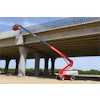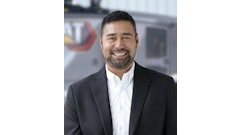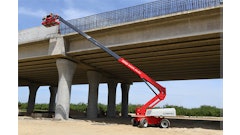The test can move forward following today's announcement by the US Department of Transportation that the I-95 Corridor Coalition's Surface Transportation System Funding Alternatives (STSFA) grant application was selected to receive $1,490,000 in matching federal funds to conduct a Mileage-Based User Fee (MBUF) project.
The STSFA grant program is a component of the Fixing America's Surface Transportation (FAST) Act designed to demonstrate alternative revenue mechanisms that employ a user fee structure to maintain the long term solvency of the Highway Trust Fund.
The receipt of this grant provides the coalition with a unique opportunity to explore the feasibility of replacing the gas tax with a mileage-based user fee in a multistate environment.
DelDOT Secretary and I-95 Corridor Coalition Chairperson Jennifer Cohan said, "Our coalition of state DOTs has a demonstrated ability to push innovation and take on challenges that reach beyond state borders. Finding sustainable revenue to replace stagnant fuel tax receipts is clearly a sensitive topic with the public. That makes this project a fantastic opportunity to foster dialogue about how our transportation system is funded, the need for a reliable revenue source and how citizens benefit from the mobility our region provides."
The coalition's project will include pre-deployment activities to begin addressing the challenges associated with a user-based approach to revenue generation. These will include strategies to address privacy concerns, equity questions, administration costs and out-of-state usage.
"Investments in transportation infrastructure are critical to create jobs, grow the economy, and protect our people, so it is vital that we have sustainable funding for our roads and bridges," says Delaware Governor Jack Markell. "We can be proud of recent steps to strengthen our Transportation Trust Fund, but long-term challenges remain, and I thank Secretary Cohan and her team at DelDOT for leading regional and national innovations to address the reality that the way we supported our transportation system in decades past will not work indefinitely."
"I always say if something is worth having, then it's worth paying for, and the bottom line is that the people who use our roads and bridges should pay to maintain them" says U.S. Sen. Tom Carper. "For too long, we've shirked our responsibility to adequately fund our country's transportation system, instead opting to kick the can down the road so somebody else can clean up our budgetary mess. It's high time we explore more responsible ways to rebuild and maintain our roads, highways and bridges, and this federal grant makes an important investment in doing just that."
"Our infrastructure needs to be paid for-something the US Chamber of Commerce and AFL-CIO all agree on," said Sen. Chris Coons. "As a country, we don't do a good job of paying for what we currently have. This has become even more difficult as cars become more fuel efficient and as people drive electric cars, and as our infrastructure needs become more expensive. This grant is helpful because we need to be exploring ways where we finance our roads and bridges in a way that is equitable to all users while still incentivizing people who buy alternative fuel vehicles that are better for our environment."
"Investing in transportation and infrastructure is one of the most important things we can do to drive a strong economy. These projects create jobs, and make it easier for businesses of all types to succeed," said U.S. Rep. John Carney. "As important as these projects are, we need to have adequate, reliable ways of paying for them. With this grant, Delaware will help lead the nation in determining new and innovative ways to fund transportation projects. I'm glad that our input and expertise will be part of this critical process going forward."
Delaware will be one of several states to conduct 500-vehicle pilot tests in support of the research. These pilots will be part of the overall outreach and education process, to demonstrate to a focused group of state and local decision makers and key stakeholders how a user fee system may work. The goal is to demonstrate how a viable, fair, flexible and sustainable funding source for transportation can work in the real world.
The proposed project will be managed and overseen by an MBUF Steering Committee of coalition members, including DOT staff involved in the proposal submission, Divisions of Motor Vehicles (DMVs) and finance agencies - along with other key stakeholders from the tolling industry. The MBUF Steering Committee will be co-chaired by Secretary Cohan and Patricia Hendren, Executive Director of the I-95 Corridor Coalition. Under the oversight of, and as directed by, the steering committee, the planning and technical work will be performed by CH2M HILL Engineers, Inc. (CH2M), the firm, and many of the same staff who were responsible for the success of the road usage charge systems in Oregon and are evaluating current efforts in California.










![Hcm Ax Landcros Dual Branded Logo[25]](https://img.forconstructionpros.com/mindful/acbm/workspaces/default/uploads/2025/11/hcmaxlandcros-dual-branded-logo25.Qhg3vUCjoK.jpg?ar=16%3A9&auto=format%2Ccompress&bg=fff&fill-color=fff&fit=fill&h=135&q=70&w=240)




